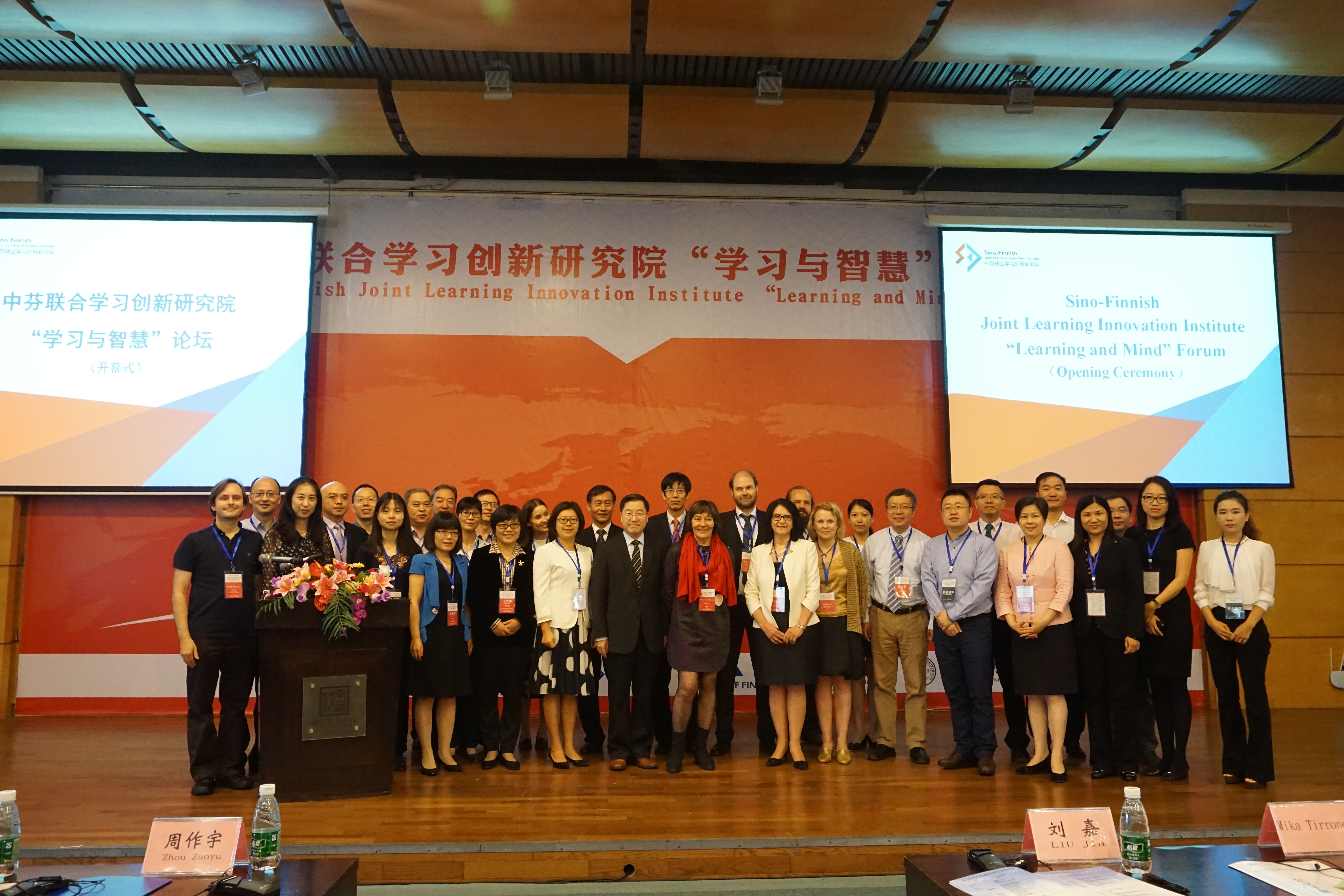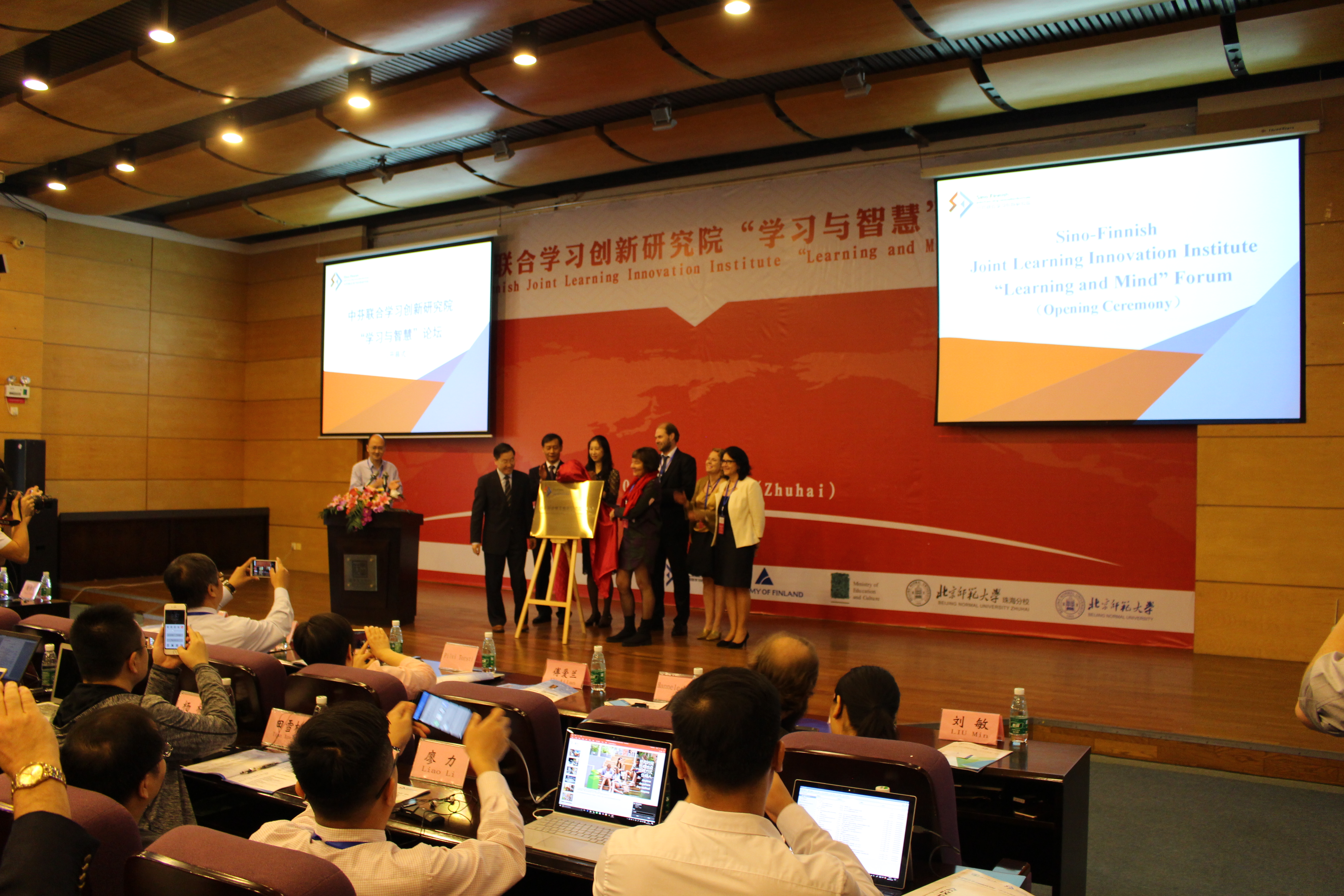There were eight keynote speeches in the morning on October 24 and 25. Keynote speakers were: Professor Anna Mauraen, Vice Rector at University of Helsinki. Professor REN Youqun, Vice president at East China Normal University. Dr. Pilvi Torsti, Former State Secretary at the Ministry of Education. Professor LIU Baocun, Dean of Institute of International and Comparative Education, Faculty of Eucation, Beijing Normal University. Professor Hannele Niemi, Chair of Sino-Finnish Joint Learning Innovation Institute, University of Helsinki. Professor ZHAO Yufang, Deputy Director, Faulty of Psychology, Southwest University. Professor Jari Lavonen, Dean of Teacher Education, University of Helsinki. Professor WANG Zhenhong, Dean of Psychology, Shanxi Normal University.
2. Researchers across Contexts
Professor Anna Mauraen advised that “collaborations between education researchers across contexts is crucial, and this is the particular strength of the collaborative network in China and Finland on learning research that are manifest in the Sino-Finnish Joint Learning Innovation Institute (JoLii).”
3. Rethink the Relationship between Learning Science and Instructional Practice
“In the past a quarter of a century, learning science contributes various theories, models, and learning environments and tools, which promotes the development and transformation of learning and instruction dramatically. Additionally, the nature of instructional practice is multi-dimensional, complex, and always involved in a context, which provides continuous research questions and challenges to learning scientists. Therefore, is needs to analyze and rethink the relationship between learning science and instructional change from a perspective reflecting the ongoing interaction between them.”
4. Educational Ecosystem in Finland
Professor Hannele Niemi shared “an overview of how the Finnish educational ecosystem has strived for equality and high quality.” “The new national core curriculum was accepted in 2014 and schools started with their local based curricula in August 2016. One area in which the idea of an ecosystem is growing more important is digitalization and the use of educational technology in teaching and learning.”
5. Big Ideas from Enterprises
Seven enterprises were invited, they were: China Mobile Government & Enterprise, Education Innovation Center; NetGragon Websoft Inc.; IFLYTEK Co., LTD.; Tstudy Co., LTD.; EduCluster Finland LTD,; Dalian Great Miller Technology Co., LTD.; and Beijing Jetsen Technology Co., LTD. Inviting enterprises to attend the “Learning and Mind” Forum showed a new Double Quadrangle model of Jolii, which governments, universities, schools, and enterprises from both China and Finland tackle key problems in learning collaboratively.
China Mobile through the most advanced technology of Internet of Things to solve arising problems in educational informatization and to explore possibilities in the interaction between home, school, school security, and smart devices, etc. Now China Mobile has promoted infrastructure construction in 31 provinces, built partnership with 476 kindergartens, and registered 90 million users. Infrastructure would no longer restrict sharing high-quality teaching and learning resources with disadvantage areas in China.
NetDragon focused on implementing immersion Virtual Reality (VR) in teaching and learning. The technology of VR could build a relatively ‘real’ leaning environment for students. In such environment, abstract knowledge became visible. Teachers may design their own VR lessons by software or application developed by NetDragon that leaded to engagement, individualized learning, and fun learning.
iFLYTEK took the lead in recognizing speech content, speakers, language and other information. Speech assessments supported by iFLYTEK has been approved by the Naitonal Language Committee and used in large scale. For example, the technology was officially applied in proficiency test of speaking standard Chinese (PSC) across 31 provinces, tested over 22 million people. In addition, Oral English Evaluation Technology has been applied to 10 million people in Senior-high School and College Entrance Examination. Technology helped schools to set up new evaluation and assessment platform.
In general, leading researchers, K-12 teachers, and enterprises representatives presented up-to-date researches and practices in education. Here are some takeaways that attendees identifies as particularly relevant and impressive.
 Picture 2: Speakers took picture together
Picture 2: Speakers took picture together



 Address: Sino Finnish Joint Learning Innovation Institute Beijing Normal University New Main Building 1424B, 19 Xin Jie Kou Wai Street
Address: Sino Finnish Joint Learning Innovation Institute Beijing Normal University New Main Building 1424B, 19 Xin Jie Kou Wai Street